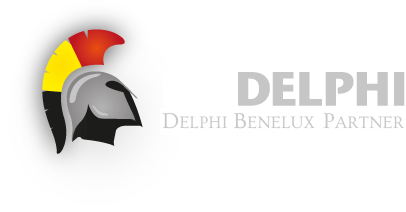We just enrolled on GitHub Sponsors!
Aim is to allow proper evolution of our Open Source project, especially the upcoming mORMot2.
2020-07-02
2020-07-02. Synopse Company
We just enrolled on GitHub Sponsors!
Aim is to allow proper evolution of our Open Source project, especially the upcoming mORMot2.
2020-03-03
2020-03-03. Open Source › mORMot Framework
The more I think of it, the more I am convinced it is time to change how the
framework is versioned.
We have version 1.18 since years... difficult to follow... time to upgrade!
I would like to upgrade mORMot to version 2 - with a major
refactoring.
2016-04-22
2016-04-22. Open Source
You should have noticed that Delphi 10.1 Berlin has been released. Our Open Source projects, including mORMot and SynPDF and their associated documentation have been updated to support this new revision. Any additional feedback is welcome, as usual!
2015-04-06
2015-04-06. Open Source › mORMot Framework

When publishing SOA services, most of them are defined as
stateless, in a typical query/answer pattern - see
Service-Oriented Architecture (SOA).
This fits exactly with the RESTful approach of Client-Server
services via interfaces, as proposed by the framework.
But it may happen that a client application (or service) needs to know the state of a given service. In a pure stateless implementation, it will have to query the server for any state change, i.e. for any pending notification - this is called polling.

Polling may take place for instance:
It may therefore sounds preferred, and in some case necessary, to have the ability to let the server notify one or several clients without any prior query, nor having the requirement of a client-side timer:
Our mORMot framework is therefore able to easily implement
asynchronous callbacks over WebSockets,
defining the callbacks as interface parameters in service method
definitions - see
Available types for methods parameters.
2015-04-06. Open Source › mORMot Framework
In a previous
article, we presented how Master/Slave replication may be easily
implemented in mORMot's RESTful ORM.
Do not forget to
visit the corresponding paragraphs of our online documentation, which has
been updated, and is more accurate!

Sometimes, the on-demand synchronization is not enough.
So we have just introduced real-time replication via WebSockets.
For instance, you may need to:
TTimer is not an option;In this case, the framework is able to use WebSockets and
asynchronous callbacks to let the master/slave replication - see
Asynchronous callbacks - take place without the need to ask explicitly
for pending data.
You would need to use
TSQLRestServer.RecordVersionSynchronizeMasterStart,
TSQLRestServer.RecordVersionSynchronizeSlaveStart and
TSQLRestServer.RecordVersionSynchronizeSlaveStop methods over the
proper kind of bidirectional connection.
2014-12-31
2014-12-31. Open Source › mORMot Framework
How would be 2015 like for our little rodents?
Due to popular request of several users of mORMot, we identified and
designed some feature requests dedicated to BigData process.

In fact, your data is the new value, especially if you propose
SaaS (Software As A Service)
hosting to your customers, with a farm of mORMot
servers.
Recent Linux support for mORMot servers, together with the
high performance and installation ease of our executable, open the gate to
cheap cloud-based hosting.
As a consequence, a lot of information would certainly be gathered by
your mORMot servers, and a single monolithic database
is not an option any more.
For mORMot solutions hosted in cloud, a lot of data may be generated. The default SQLite3 storage engine may be less convenient, once it reaches some GB of file content. Backup becomes to be slow and inefficient, and hosting this oldest data in the main DB, probably stored on an expensive SSD, may be a lost of resource. Vertical scaling is limited by hardware and price factors.
This is were data sharding comes into scene.
Note that sharding is not replication/backup, nor clustering, nor just
spreading. We are speaking about application-level data splitting, to ease
maintenance and horizontal scalability of mORMot servers.
Data sharding could already be implemented with mORMot servers,
thanks to TSQLRestStorage:
TSQLRestStorageExternal: any table may have its own
external SQL database engine, may be in its separated DB server;TSQLRestStorageMongoDB: any table may be stored on a
MongoDB cluster, with its own sharding abilities;TSQLRestStorageRemote: each table may have its own
remote ORM/REST server.But when data stored in a single table tends to grow without limit, this
feature is not enough.
Let's see how the close future of mORMot looks like.
2014-11-20
2014-11-20. Open Source › mORMot Framework
We just finished our Be-Delphi 2014 sessions and drank our last beers, so
here we are.
I published some slides for this great event.
2014-10-08
2014-10-08. Synopse Company
Just a small message to let you know that I was invited, as a speaker to the BE Delphi 2014 event. This year, the sessions will focus on n-Tier development, so our little mORMot does make sense in the landscape! If you are in Belgium or in Europe, we would be very pleased to meet you there! Thanks […]
2014-08-20
2014-08-20. Open Source › mORMot Framework
If you use our little mORMot framework in any of your project,
commercial or not, please report it to a new
forum thread dedicated for this!
Sounds like if more and more projects are using our little rodent...
The cross-platform clients did increase its popularity, as far as I found out,
in the last days.

Furthermore, if you accept that your application is quoted in our framework documentation and web site, and/or your logo displayed, please notify it in the application post or by email to us.
The first listed application - EasyMail7 Client-Server Email Marketing Solution - is indeed impressive, and shows well the Client-Server and storage abilities of the framework.
2014-08-11
2014-08-11. Open Source › mORMot Framework

Current version of the main framework units target only Win32 and Win64 systems.
It allows to make easy self-hosting of mORMot servers for local
business applications in any corporation, or pay cheap hosting in the Cloud,
since mORMot CPU and RAM expectations are much lower than a regular
IIS-WCF-MSSQL-.Net stack.
But in a Service-Oriented Architecture (SOA), you would probably need
to create clients for platforms outside the Windows world, especially
mobile devices.

A set of cross-platform client units is therefore available in the
CrossPlatform sub-folder of the source code repository. It allows
writing any client in modern object pascal language, for:
This series of articles will introduce you to mORMot's Cross-Platform abilities:
Any feedback is welcome in our forum, as usual!
2014-08-11. Open Source › mORMot Framework

Current version of the main framework units target only Win32 and Win64 systems.
It allows to make easy self-hosting of mORMot servers for local
business applications in any corporation, or pay cheap hosting in the Cloud,
since mORMot CPU and RAM expectations are much lower than a regular
IIS-WCF-MSSQL-.Net stack.
But in a Service-Oriented Architecture (SOA), you would probably need
to create clients for platforms outside the Windows world, especially
mobile devices.

A set of cross-platform client units is therefore available in the
CrossPlatform sub-folder of the source code repository. It allows
writing any client in modern object pascal language, for:
This series of articles will introduce you to mORMot's Cross-Platform abilities:
Any feedback is welcome in our forum, as usual!
2014-08-11. Open Source › mORMot Framework

Current version of the main framework units target only Win32 and Win64 systems.
It allows to make easy self-hosting of mORMot servers for local
business applications in any corporation, or pay cheap hosting in the Cloud,
since mORMot CPU and RAM expectations are much lower than a regular
IIS-WCF-MSSQL-.Net stack.
But in a Service-Oriented Architecture (SOA), you would probably need
to create clients for platforms outside the Windows world, especially
mobile devices.

A set of cross-platform client units is therefore available in the
CrossPlatform sub-folder of the source code repository. It allows
writing any client in modern object pascal language, for:
This series of articles will introduce you to mORMot's Cross-Platform abilities:
Any feedback is welcome in our forum, as usual!
2014-08-11. Open Source › mORMot Framework

Current version of the main framework units target only Win32 and Win64 systems.
It allows to make easy self-hosting of mORMot servers for local
business applications in any corporation, or pay cheap hosting in the Cloud,
since mORMot CPU and RAM expectations are much lower than a regular
IIS-WCF-MSSQL-.Net stack.
But in a Service-Oriented Architecture (SOA), you would probably need
to create clients for platforms outside the Windows world, especially
mobile devices.

A set of cross-platform client units is therefore available in the
CrossPlatform sub-folder of the source code repository. It allows
writing any client in modern object pascal language, for:
This series of articles will introduce you to mORMot's Cross-Platform abilities:
Any feedback is welcome in our forum, as usual!
2014-05-30
2014-05-30. Open Source › mORMot Framework
We got a very instructive
discussion in our forums, with Silvio, the maintainer of the
Brook Framework.
Brook is a nice framework for writing web applications using Free
Pascal.
It comes to my mind what mORMot can offer.
We did not want to compare the features or say that one framework is better
than the other, but it appeared to me that a lot of object pascal programmers
are tied to 20th century programming model.

In fact, to embrace the potentials of mORMot, you need to switch your mind, and enhanced your RAD and OOP background, into 21th century SOLID model.
2014-04-18
2014-04-18. Open Source › mORMot Framework
We have just released a set of slides introducing ORM, SOA, REST, JSON, MVC, MVVM, SOLID, Mocks/Stubs, Domain-Driven Design concepts with Delphi, and showing some sample code using our Open Source mORMot framework. You can follow the public link on Google Drive! This is a great opportunity to […]
2014-02-28
2014-02-28. Open Source
After more than 5 years of opening some huge part of Delphi code base, just my two cents.
Free software means free as a bird.
In practice, most Open Source "consumers" focus on free as a free
beer...
This is a reality, especially for "niche" projects like developing libraries
for Delphi.

Here are some thoughts from my little experiment with mORMot.
If you ask what Open Source for libraries mean, it may help you!
2013-03-25
2013-03-25. Open Source › SynProject documentation and versioning
We have uploaded an updatetd compiled version of our Open Source SynProject tool in SynProject.zip. Synopse SynProject is an open source application for code source versioning and automated documentation of software projects. Licensed under a GPL license. Main feature is a new (better-looking?) […]
2013-01-28
2013-01-28. Open Source › mORMot Framework
Some major speed improvements have been made to our SynDB*
units, and how they are used within the mORMot persistence
layer.
It results in an amazing speed increase, in some cases.
Here are some of the optimizations how took place in the source code trunk:
EngineAddUseSelectMaxID to unset
this optimization - we noted that this modification circumvented a known limitation of Firebird very
efficiently.Overall, I observed from x2 to x10 performance boost with simple
Add() operations, using ODBC, OleDB and direct Oracle access, when
compare to previous
benchmarks (which were already impressive).
BATCH
mode performance is less impacted, since it by-passed some of those
limitations, but even in this operation mode, there is some benefits
(especially with ODBC and OleDB).
Here are some results, directly generated by the supplied "15 - External DB performance" sample.
2013-01-20
2013-01-20. Open Source › mORMot Framework
A long-time mORMot user and contributor just made a proposal on our
forums.
He did use mORMot classes to integrate a SpiderMonkey
JavaScript engine to our very
fast and scaling HTTP server, including our optimized JSON serialization
layer.

Today, he sent to me some of his source code, which sounds ready to be included in the main trunk!
This is a great contribution, and Pavel's goal is nothing less than
offering
Delphi based, FAST multithreaded server with ORM and node.js modules
compatible.
2012-12-31
2012-12-31. Open Source › mORMot Framework

Even if mORMot will be more easily used in a project designed from scratch, it fits very well the purpose of evolving any existing Delphi project, or even creating the server side part of an AJAX application.

One benefit of such a framework is to facilitate the transition from a Client-Server architecture to a N-Tier layered pattern.
« previous entries - page 1 of 2